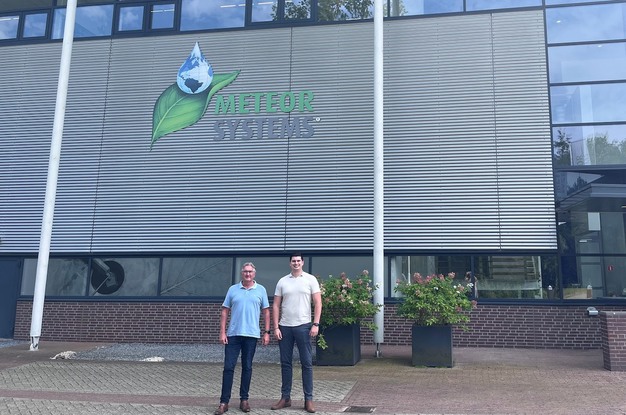Australia is a huge country. In terms of surface area, but also certainly in terms of horticulture, a sector that is very diverse Down Under. Around Melbourne, there's mostly vegetable cultivation, while around Brisbane strawberries are widely grown. Peter Lexmond, Commercial Director with Meteor Systems, was in Australia recently and shares his findings on the horticultural sector there.
 Peter Lexmond and Alex van der Meulen, Meteor Systems
Peter Lexmond and Alex van der Meulen, Meteor Systems
Melbourne: Stable vegetable market
First, Peter talks about what he saw around Melbourne. "The market for vegetables there is very stable, with about 15 big growers and a total glasshouse-covered area of around 300ha. And there are a few large sales organizations, similar to North America. Competition there isn't particularly fierce, and growers only expand when there is really room in the market."
As for challenges, energy and labor are a hot topic. "It's hard to get enough hands for harvesting. And oil and gas prices keep going up, while there don't really seem to be any alternatives in terms of energy – for a country with so much sun, for example, you would expect to see a lot more solar panels."
Standing with the customer
To do well in that market, you have to be present as a supplier. "You have to be there with the customer and help solve any problems," he says. Peter gives an example of one such challenge: "Because of fire regulations, you always have to keep one meter clear from the facade. That means it can be difficult to hang a gutter properly and stably. Now we have come up with something to overcome that, but you only find a solution like that when walking through the actual greenhouse with a grower."
Service
Standing with the customer is also important when it comes to service. "Growers really value reliable service there. Whether it's glass or trolleys, the most important consideration is whether there is a good service network behind it – growers find that even more important than quality. That is also why, in cooperation with Irribiz, which handles a lot of Greenhouse and irrigation projects locally, we have put up a gutter production machine in Australia (Meteor Systems dealer for Australia and New Zealand). That way we are not dependent on 6 weeks of transportation for such a machine."
Strawberries in soil
The second leg of Peter's trip took him to Brisbane. Most of the strawberries grown in that area are not for export. Australia is a large country with plenty of demand for strawberries, most of which, by the way, are grown outdoors in the soil. "Tunnels are used, but not for strawberries in the Brisbane area – they are used for raspberries, blackberries and blueberries," Peter says.
Because of problems with labor and disease pressure, Australian strawberry growers are increasingly looking at cultivation gutters, hence Peter's visit to the area. "Gutters are more labor-friendly, you need half as much crop protection and production is higher. There is much less crop loss, because the fungal pressure is lower."
Transition to gutters
Growers see those benefits, too – hence the transition to gutters. "As of now, about 25 to 30 percent of cultivation is done in gutters," he says. To put that in perspective: Peter was visiting a large grower with 200 hectares. "In total, there are about 1,500 hectares of strawberries, really immense. There were strawberries as far as I could see, from horizon to horizon." So it's a big market, but manageable: 20 growers account for 85 percent of production, Peter says.
Challenges in a new market
So an interesting market for Meteor Systems, which the company hopes to conquer in part with help from their partner Irribiz. Entering a new market comes with challenges, naturally – but the growers themselves also have challenges, Peter knows.
"For example, there is a lot of focus on variety selection and propagation. When you move the cultivation from soil to substrate, which requires different varieties, different things become important. As far as that is concerned, there is already a lot of experience from England, California and Mexico. Also the big breeders are working on that issue."
The challenge for Meteor is mainly in keeping the price as low as possible. It's mainly about mass: every dollar saved counts.
For more information:
Meteor Systems
Peter Lexmond
+31 6 2877 6735
